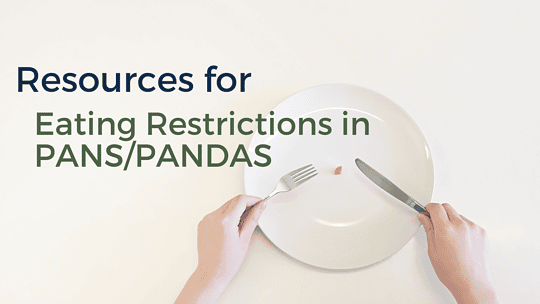
Homeschooling and PANS/PANDAS: Resources for Families
Homeschooling and PANS/PANDAS: Resources for Families Traditional school environments can be challenging for many families navigating PANS/PANDAS. Symptoms such as anxiety, OCD, cognitive...

Homeschooling and PANS/PANDAS: Resources for Families Traditional school environments can be challenging for many families navigating PANS/PANDAS. Symptoms such as anxiety, OCD, cognitive...

Restricted eating, including Avoidant/Restrictive Food Intake Disorder (ARFID), is a common yet complex challenge for individuals with PANS/PANDAS. Families and patients often struggle to find...

The Becks paid $20,000 out-of-pocket in 2023 for Emily’s medical care, including occupational therapy, psychiatric appointments, tests, supplements and medications that insurance wouldn’t pay for...
Tang AW, Swedo SE, Pasternack M, Murphy T, et al. Eight cases of pediatric acute-onset neuropsychiatric syndrome: clinical characteristics. Developmental Neuroscience. 2025;47(4):287–302. doi:10.1159/000543969
Please read more in depth blog – When PANS and IBD Co-Occur: What This Case Series Suggests
Identifies a subgroup of children with PANS characterized by the triad of PANS symptoms, joint complaints, and family history of autoimmunity (including psoriasis).
Suggests this subgroup may be at increased risk for inflammatory bowel disease and other immune-mediated disorders.
Recommends a low threshold for evaluation of gastrointestinal inflammation using biomarkers such as hemoglobin, CRP, fecal calprotectin, and endoscopy when indicated.
Reports that PANS symptoms may improve with effective treatment of inflammatory bowel disease.
Notes high prevalence of joint complaints and autoimmune family history, suggesting shared immune mechanisms with psoriasis and arthritis.
Proposes that treatments used in inflammatory bowel disease and arthritis warrant study for potential application in PANS.

Looking for ASPIRE ChitChats? ASPIRE ChitChats are supportive, peer-to-peer meetings for parents of children with PANS and adults living with PANS. These gatherings—both online and in...

Zoom - Louisiana ChitChat - Thursday, February 27 - 3:00 PM CT...

ASPIRE to Speak at NJSSNA Spring 2025 Conference – Pearls of Wisdom for School Nurses Conference Details Friday, March 28, 2025 at 6:00pm ET – Saturday, March 29,...

We’re Exhibiting at the Patient 360 Virtual Conference! ASPIRE is excited to join the IgNS Patient 360 Virtual Conference on March 8–9, 2025! This FREE, two-day event connects patients,...

Stay Connected with PANS/PANDAS Updates in Louisiana. Join our community! Together, we can make a difference. Share your contact information to receive updates specific to PANS/PANDAS in Louisiana,...

Missouri Legislative Action is lead by Annie Steil at Missouri PANS/PANDAS Coalition (Facebook and Instagram). Please contact her directly to become involved in legislative advocacy in Missouri. ...
Rachel Goren, Ari Bitnun, Asif Doja, Peter J Gill, Ronald M Laxer, Deborah M Levy, Tamara Pringsheim, Paul Sandor, Eluen Ann Yeh, Colin Wilbur, Sefi Kronenberg, Michelle Shouldice, Frequency and impact of paediatric acute-onset neuropsychiatric syndrome/paediatric autoimmune neuropsychiatric disorders associated with streptococcal infections diagnosis in Canada, Paediatrics & Child Health, 2024;, pxae092, https://doi.org/10.1093/pch/pxae092
In a Canadian study, a significant percentage of children diagnosed with PANDAS/PANS had OCD and/or tics, with the majority experiencing at least two neuropsychiatric symptoms, and healthcare utilization was high, including emergency visits and inpatient admissions